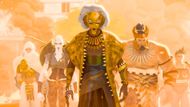Before the rise of T’Challa, before Wakanda opened its borders, there were the War Dogs. Trained in secrecy and dispatched across continents, they operated in the shadows to protect the most powerful resource on Earth: vibranium.
In Eyes of Wakanda, Marvel finally brings this elite spy force to the center of the story; however, far from being just another action-heavy prequel, the animated series rewrites what we thought we knew about Wakandan history, legacy, and responsibility.
Spanning centuries and continents, each episode follows a different War Dog on a mission to retrieve stolen or misplaced vibranium. What unfolds is not just a parade of historical cameos or fantasy combat, but a confrontation with the moral weight of power. Who gets to decide what is right? What does loyalty look like across generations? And how far can a nation go to protect itself before it becomes something else entirely?
This explainer unpacks who the War Dogs are, what Eyes of Wakanda reveals about their place in the Marvel timeline, and why their legacy matters more than ever in the future of the MCU.

Who are the War Dogs?
First introduced in Black Panther (2018), the War Dogs are Wakanda’s secret intelligence agents. Known in the comics as the Hatut Zeraze, they operate globally under deep cover to observe, report, and retrieve. Their mission is simple on paper but ethically complex in practice: protect Wakanda’s secrets and retrieve vibranium from the outside world without exposing the nation’s existence.
They are not warriors in the traditional sense. They are spies, diplomats, saboteurs, and sometimes ghosts. Their identities are often hidden, even from each other. In Black Panther, Nakia was one of them, embedded in Nigeria on a humanitarian operation that masked her surveillance role, but Eyes of Wakanda goes far deeper, revealing that the War Dogs are not a modern invention. They have existed for centuries, always watching, always intervening when Wakanda’s interests are at risk.
Each one of the four episodes of the series presents a different War Dog in a different historical context. Ancient Crete. Medieval China. Nineteenth-century Ethiopia. The scope of their influence stretches across geography and time. These missions are personal and national at once. Some end in success, others in blood, but all of them ask the same question: What does it cost to protect a secret for hundreds of years?

What Eyes of Wakanda reveals about them
Unlike previous MCU entries where the War Dogs remained in the background, Eyes of Wakanda makes them the heart of the narrative. The series is not about kings, thrones, or vibranium as a symbol of power. It is about the people sent out of Wakanda to make sure its power never falls into the wrong hands, and the price they pay for doing that job in silence.
Each of the four episodes explores a different moment in history. The stories are not connected by character but by purpose. A mission in Ancient Crete. A confrontation in the Ming dynasty. A decision made in Ethiopia in 1896. These agents are not superhuman, and the missions do not always end in flawless victory. Sometimes they make mistakes and sometimes they succeed at the cost of everything else.
By placing the War Dogs at the center, the series reframes Wakandan history as one shaped as much by its hidden agents as by its rulers. It also opens a deeper question: If vibranium is the most powerful substance in the world, who gets to decide how far is too far when protecting it?
Why the War Dogs matter to the MCU
The final episode of Eyes of Wakanda changes everything. It connects a single War Dog mission in 1896 to the broader continuity of the Marvel universe. A decision made in that year to remove a vibranium weapon from foreign hands alters the course of Wakandan history. In one timeline, the country opens to the world. In another, it retreats into silence and the world suffers. A Panther returns to the past to warn a younger generation. The message is clear: what the War Dogs do shapes not only Wakanda but also the entire future of the planet.
This ripple effect reframes much of what we thought we knew. The secrecy of Wakanda, the hesitation to share its knowledge, the trauma of colonial entanglement? It all traces back to decisions made in the field, often by unnamed agents whose faces we never saw. The War Dogs are not side characters anymore. They are the backbone of Wakanda’s survival and its legacy.
For the MCU, this opens new doors. The series does not just flesh out lore. It sets up potential stories that could echo into live-action, whether through Black Panther sequels, the upcoming Killmonger project or broader multiverse consequences. And more than that, it plants a thematic anchor. In a universe filled with gods and mutants and cosmic threats, Eyes of Wakanda reminds us that history is shaped not by spectacle but by choices made in silence.
From espionage to exile: how the War Dogs shaped key MCU arcs
The War Dogs have always operated in the shadows, but their influence echoes across some of the most pivotal events in the MCU. Their global infiltration network allowed Wakanda to monitor international conflicts, political shifts, and potential threats long before the world even knew vibranium existed.
In Black Panther, we learn that N'Jobu, a War Dog stationed in Oakland, became radicalized by what he witnessed abroad. His decision to arm oppressed communities and his betrayal of Wakanda’s secrecy would ripple through generations, setting the stage for Killmonger's rise. That one War Dog’s disillusionment led to a crisis of identity for the entire nation.
The War Dogs also played a crucial role in Wakanda’s gradual opening to the world. Nakia, another War Dog, represents the modern reinterpretation of their purpose. Rather than simply observe, she acts, rescuing hostages, intervening in humanitarian crises, and pushing for a more active Wakandan presence globally. Her philosophy directly influenced T’Challa’s final decision to end Wakanda’s isolation.
What Eyes of Wakanda seems poised to do is finally map the connective tissue. The legacy of the War Dogs is stitched into the lives of those who never wore the necklace or sat on the throne but who shaped the course of Wakandan history just the same.
Eyes of Wakanda and the ethical legacy of the War Dogs
The War Dogs were never just spies. They were Wakanda’s conscience abroad, witnesses to suffering, injustice, and war. But what happens when you witness too much? That’s the question Eyes of Wakanda is beginning to ask, and it doesn’t offer easy answers.
N'Jobu broke faith with Wakanda not out of greed or hunger for power, but because the War Dogs had no mandate to help. They were told to observe, never intervene. His decision to act, to try and change the world instead of just watching it fall apart, was condemned as betrayal. Yet his moral fracture wasn’t born from evil. It was the inevitable consequence of an empire demanding silence from its eyes and ears.
This dilemma now defines the War Dogs' legacy. Nakia’s interpretation offers one path: service over secrecy, protection over tradition. But how many others burned quietly in the gap between duty and justice? How many War Dogs were forced to choose between their orders and their humanity?
In focusing on these stories, Eyes of Wakanda becomes more than a side series. It becomes a reckoning, and not only with Wakanda’s past, but also with the cost of choosing not to act.
